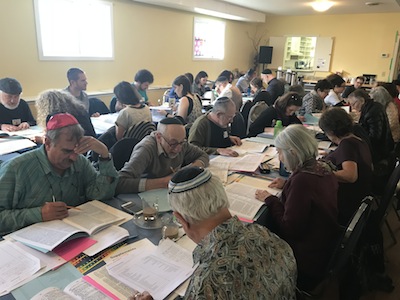Rabbi Benay Lappe, founder and rosh yeshivah of Svara, in Chicago, taught Talmud at Congregation Or Shalom earlier this month. (photo from Or Shalom)
“For all you straight folks, let me tell you – you’re all queer. Your job is to find that queer part of you, wear it on you, walk it through the world. That’s how the world changes.”
Rabbi Benay Lappe, founder and rosh yeshivah of Chicago’s Svara: A Traditionally Radical Yeshivah, made this observation during a lecture at Congregation Or Shalom on March 10. Lappe is a passionate and unique teacher of Talmud, who is “dedicated to bringing the Talmud to the 99%,” meaning the majority of Jews who do not study it.
As Lappe explained at Or Shalom, there are three kinds of queer. The first refers to, as she put it, “me, a lesbian woman, and other people with non-heteronormative sexualities or folks who are trans or non-gender-conforming. The second refers to those who ally themselves with queers, embracing queer culture and rights. The third category is someone profoundly ‘othered’ or marginalized, who owns that experience and walks it through the world as a critique to the mainstream.”
It is in the third sense of the word that Lappe addressed the audience. “The rabbis who wrote the Talmud were a small group of queer, fringey people,” she said, explaining that the talmudic sages were a small group of Jews who responded to a time of crisis in Jewish history with radical creativity. When the Temple was destroyed after centuries of colonization at the hands of the Romans, only one group was poised to respond effectively – the sages who wrote the Mishnah, and their spiritual descendants, who later wrote the Talmud. “When the master story doesn’t work anymore,” said Lappe, “it matters how you respond.”
According to Lappe, for the Jews of that time, some retreated into the old story and built walls around it, many abandoned the Jewish story and assimilated, and a small group remained faithful to the Torah while radically transforming and updating it. The Talmud, she explained, records for posterity how the rabbis evolved Judaism. “The rabbis knew that master stories change,” she said, “and they encoded a set of mechanisms into their new master story that enabled constant change.”

The “new master story” is embedded in the Talmud, which was updated to reflect changing moral and social sensibilities. It shifted Judaism from a Temple-based religion practised in Israel to a home- and synagogue-based one founded on a communal and personal discipline of halachah (Jewish law) that could be practised anywhere. Lappe believes that, through studying the Talmud in a non-fundamentalist way, in a way that gives primacy to the power of our reason and moral intuition in confrontation with the text, we can learn lessons for how to transform and vitalize Judaism today. (Reason is “svara” in Aramaic, the name of her yeshivah.)
According to Lappe, Judaism is once again going through what she calls a “crash,” a shattering of its master story, and the study of Talmud provides us with case studies in how to respond.
Lappe has an enthusiastic supporter in Or Shalom’s Rabbi Hannah Dresner.
“I have known Rabbi Benay for many years; we shared a spiritual community in Chicago,” said Dresner. “She is fun and funny and tough and with the quickest mind. Her crash theory is a different languaging of Reb Zalman Schachter-Shalomi’s theory of paradigm- shifted halachah. This is based on the truth that halachah, as a path, is meant to evolve and move forward, alive in the pilpul, in the wrestling of how we can enact Torah now, in our authenticity.” (Schachter-Shalomi is the founder of the Jewish Renewal movement to which Or Shalom belongs.)
“I always thought I was at the margins of Judaism, being a queer Jewish woman,” said Alicia Jane Fridkin, who attended the weekend teachings. “Rabbi Benay helped me to realize that queer people are not at the margins: we are at the forefront of an ever-changing religion. She illustrated how each era of Judaism began with radical Jews who sought to practise in new and meaningful ways, including the era of rabbinical Judaism that we have been practising for the past 2,000 years.”
Fridkin added, “I immediately blocked off the dates in my calendar for Queer Talmud Camp at her yeshivah, Svara, which I hope to attend this summer.”
Matthew Gindin is a freelance journalist, writer and lecturer. He writes regularly for the Forward and All That Is Interesting, and has been published in Religion Dispatches, Situate Magazine, Tikkun and elsewhere. He can be found on Medium and Twitter.

